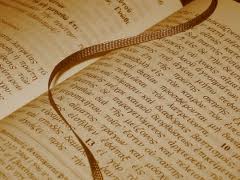"The Same Yesterday and Today and Forever" -- Hebrews 13:1-16
 Tuesday, May 6, 2014 at 11:02AM
Tuesday, May 6, 2014 at 11:02AM  The Twenty-Fourth in a Series of Sermons on the Epistle to the Hebrews
The Twenty-Fourth in a Series of Sermons on the Epistle to the Hebrews
The author of Hebrews will now bring his letter to a close. He is writing to a church going through a very difficult time of trial. We don’t know where this church was (probably in Rome or possibly in Alexandria). Nor do we know much about the congregation–which likely was small and met in someone’s home. But we do know that one pressing issue facing this church was that a number of their members had left the church and returned to Judaism. So, throughout the first twelve chapters of this epistle the author has made his case for the superiority of Jesus Christ. The creator of all things, and the redeemer of God’s people, Jesus is far superior to angels, to Moses, and to the priests of Israel. His is an eternal priesthood after the order of Melchizadek, and Jesus serves as priest in the heavenly temple, of which the earthly temple was a type and shadow. But as the author wraps up this epistle he issues a number of direct exhortations to those receiving this letter. These exhortations are well-familiar to readers of the New Testament. These include the need to love others (especially our brothers and sisters in Christ), to exercise hospitality, to have compassion upon those imprisoned (likely because of their faith in Christ), and that Christians must avoid all forms of sexual immorality. Yet, as the author goes on to point out, these exhortations only make sense in light of Jesus Christ’s sacrifice for our sins.
We have spent some twenty-four Sundays working our way through this epistle, and we have but several more Sundays to go as we tackle the final chapter of this letter (Hebrews 13). I faced the option of rushing through the final chapter in one sermon, or else covering chapter 13 in two Sundays when there is not really a good place in the chapter to divide the author’s concluding remarks. So, I decided to cover the first half of chapter 13 (vv. 1-16) this time, and then, Lord willing, we will conclude our series next time.
As we saw during our study of Hebrews 11, the author gave us a redemptive-historical survey (the so-called “hall of faith”) to make the point that a number of Old Testament figures (some of whom on the list surprise us) were looking ahead to the fulfillment of God’s covenant promise. That covenant promise is now fulfilled in Jesus Christ, who is, as we read in chapter 12, the founder and perfecter of faith. In light of the fact that God’s gracious covenant promise is fulfilled in Christ, the author exhorts us to run the race (live the Christian life) all the while keeping our gaze fixed upon Jesus Christ at the finish line. As sons and daughters of God (because of Jesus who is our mediator), we must endure the race, and at the same time grow to appreciate the discipline we receive from our heavenly father who loves us and does what is best for us because we are his adopted children.
As we saw last time when we wrapped up our time in chapter twelve, God’s glory was manifest upon Mount Sinai as he give Israel his law. Sinai shook and the sky was filled with the signs of God’s holy presence–thunder and lightening. Because God’s holy presence consecrated the mountain, the people were warned that none dare approach (human or beast). Terrified, the people pled with Moses to go up on the mountain, listen to the voice of God, and then come back down tell the people what it was that God had revealed. Apart from a mediator between sinners and a holy God, no one can dare enter the presence of God or withstand his holy voice. Because we are sinful, we risk being consumed by God’s holy wrath should he approach unless a divinely-appointed mediator turns aside the wrath of God–that mediator is, of course, Jesus Christ.
To read the rest of this sermon: Click Here


Reader Comments